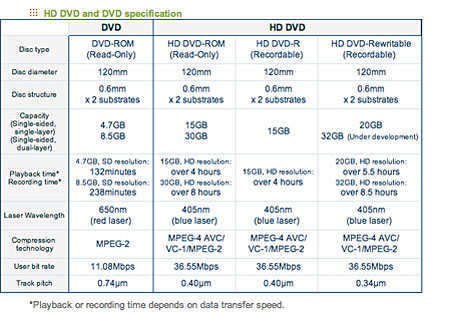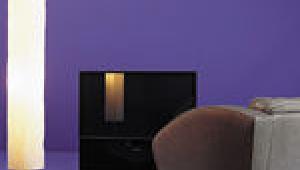HD DVD and Blu-ray Disc 2006: An In-Depth Report Page 4
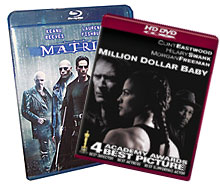 Hardware and Studio Support
Hardware and Studio Support
No coverage of a format war would be complete without showing where the battle lines are drawn with manufacturers and studios. I'll start with the smaller list, which will be HD DVD. In addition to Toshiba and NEC, only RCA and perhaps Sanyo are committed to releasing players, and by all accounts RCA's $500 player is a re-badged Toshiba HD-A1.
While the list of HD DVD supporters in the computer world is smaller than Blu-ray's in quantity, the quality is certainly there: Intel, Hewlett-Packard, and Microsoft. Microsoft has gone so far as to state publicly that it will build support for only HD DVD into its next-generation Vista operating system. I think this is more gamesmanship than truth, as it would be shortsighted for Microsoft to not be doing some development work just in case BD is the predominant format.
At this point in time only Paramount, Warner and Universal are committed to releasing movies on the HD DVD format, and of those only Universal is thus far not also committed to releasing its films on Blu-ray as well.
Among the companies solidly committed to releasing Blu-ray players this year are Sony, Panasonic, Pioneer, and Samsung. Philips will allegedly have a player this year. And LG Electronics has taken a unique approach by announcing they are working on a universal player that will spin both HD DVD and Blu-ray discs. In the computer world, Blu-ray also has a small but stellar lineup behind it: Apple, Dell, and (playing both sides of the next-gen fence) Hewlett-Packard.
Studio support is firmly in Blu-ray's favor, with seven of Hollywood's eight "major"studios committed to the format. In addition to Paramount and Warner, Fox, Disney/Buena Vista, Lion's Gate, MGM, and Sony/Columbia are all behind the Sony backed format.
The gaming console industry is evenly split- Sony's PlayStation3 (now due in November) will be based on a Blu-ray Disc drive, and Micrsoft's Xbox 360 will support HD DVD, but only by a peripheral external drive. It would take very little for the Xbox 360 to switch in this configuration should BD prove itself the victorious format.
Sales of Xbox 360 have reportedly been slower than expected. Sales numbers from March of this year showed the antiquated but now quite inexpensive PlayStation2 outselling the Xbox 360 by a substantial margin.
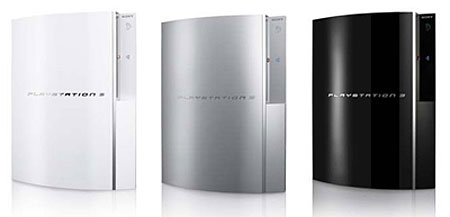
Sony expects to sell PS3 consoles in the millions upon release, and thus expects to have a huge install base of BD players in the market this holiday season.
Analysis and Predictions
HD DVD has fewer manufacturers making players and fewer studios releasing movies. As a result, its business plan all along was to get to the market ahead of Blu-ray and get the format established with consumers. This plan fell by the wayside by the end of last summer. The format finally launched on April 18th with the two Toshiba players and, in most stores, only two Warner titles for sale. And yet, it also sold out its initial US run of 10,000-15,000 players in less then two days. Still, this small release of titles comes only one month before the officially scheduled launch of BD movies.
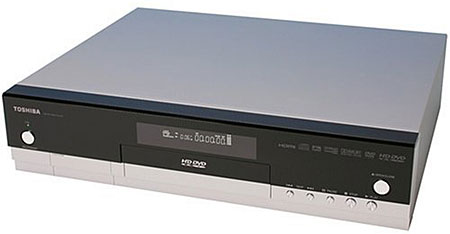
Toshiba's $500 HD-A1 HD DVD Player
Blu-ray believes that by this summer consumers at retail will find more choice in hardware, and more movies to watch with BD. While this is obviously true, it also has to be taken into account that with the delay of PS3's release to November, there won't be a single BD player available under $1000 until that time. With HD DVD uncertain consumers have only to risk $500 for the entry level Toshiba player- just a little more than a 60GB iPod, which at $400 represents an impulse buy for many.
To a certain extent, the only way to avoid a protracted format war is if consumers simply ignore HD DVD. Because Sony owns Columbia and MGM, and at least Fox and perhaps Disney seem so firmly committed to BD and its additional layers of security, those four studios are likely to release movies on HD DVD only at the bitter end. This could be years down the line. That would mean that HD DVD most likely looks forward to the support of only three studios for the foreseeable future. DVD's success was due in large part because of the ubiquitous studio support. Sony and Fox were slow to the party, but they weren't committed to a competing format. Selling a format with three studios vs. a format with seven studios is an uphill battle for sure.
On the hardware side, uncertain consumers simply want to avoid owning a boat anchor- with the large number of manufacturers behind Blu-ray, if consumers support BD it will remain viable. If HD DVD still has only Toshiba's players, the future isn't as certain, even with Microsoft in its corner. Indeed it will be interesting to see if the might of Microsoft and Intel can stand against Dell and PlayStation3. Will consumers of packaged disc media, like movies, even care which format their next computer might support? Are there enough people waiting to buy a Viiv computer and serve up movies and music all over their networked houses to make or break a format? Hard to tell.
Then there's this wild card. It's only a matter of time until Blu-ray booster Apple Computers rolls out its own vision of networked digital entertainment for the home. Apple's Steve Jobs is now Disney's largest shareholder. With Disney and Apple in Blu-ray's corner it's almost certain that BD will be a big part of Apple's networked media access. Considering Apple's success with iTunes sales of both music and video programming, it might indeed be the company to take Hollywood into the digital future, and Blu-ray along with it.
Whatever happens, I want the superior quality HD movie watching (and listening) experience that will only come on a silver disc. I'd prefer not to have two players to see movies from all the studios, but in the end I want a successful HD disc format, and so long as the quality is there I don't have a rooting interest in either format.

The Worst Case Scenario: Triple Inventory Day-and-Date Releases
I also need to note that the manufacturers behind the formats have done much to ensure slow adoption and confusion among consumers in their rush to the market. I have never been more continually frustrated in writing a feature article than with this one. Trying to determine what the actual formats' capabilities are, and then parsing that with what my current knowledge base of what the first generation players actually can do was incredibly frustrating and doesn't leave me a lot of hope for the average consumer trying to sort all this out.
Even for the hardcore enthusiast I must warn that, in spite of my general elation at having HD on a silver disc, these formats are being rushed to the market at our expense. These first players will not offer what we already know are the full capabilities of the formats. In the case of Dolby TrueHD and DTS-HD High Resolution/HD Master Audio, there are no decoders on the market yet. The HDMI spec required to transmit these signals digitally has not been finalized. The first-gen HD DVD players won't output the native 1080p signal on the discs, and can only decode Dolby TrueHD in two-channel. According to Sony and Pioneer, their first-gen Blu-ray players will offer 1080p video, apparently, but won't decode the new Dolby and DTS formats, instead encouraging content providers to use uncompressed multichannel PCM. It's unknown if this will impact picture quality in a negative way with respect to the bit budget or if other features will have to be omitted in order to make room for these soundtracks. Further, while Sony and Pioneer's BD players will playback current standard DVDs, it's been confirmed that these first-gen players will not playback redbook CDs. So don't throw that CD player out yet!
It's hard to remember now, but the DVD format, which at nearly ten years old is very slick and polished, also started out with some road bumps. Anyone remember DIVX? Or, that the first 8-bit players were slower than molasses and looked terrible? Or, that the first DTS-compatible players didn't make their debut until the second or third generation? And that DTS encoded software appeared even later than that?
There is no question though, that DVD is mature in every way, and that people already have a lot of reasons to leave this first round of next-gen players on the shelf. Maybe it only would have taken until the holiday season to incorporate some of these features, and offer consumers a more convincingly finished product. But, whether the formats are ready or not, or we're ready or not, HD on a silver disc is here. Let's just hope one of these formats is here to stay.

